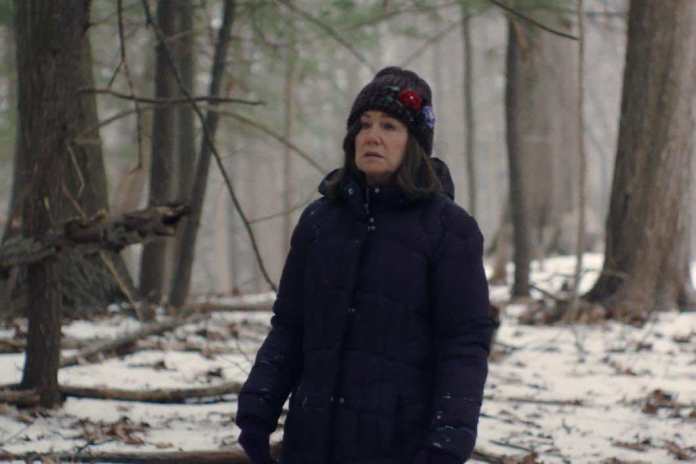
With Diane, writer-director Kent Jones reveals himself as a nuanced filmmaker with a keen sense for everyday life for people weighted by the past. Via a story featuring characters who have lived a good portion of their lives and can’t seem to shake off what they have done in their youth, Jones takes the viewer to a place where the past inevitably defines us as death’s door opens. It sounds like a heavy concept, but Jones uses a light but gritty approach bringing to mind Casavetes and Jarmusch that elevates the mundane to show how life and death intertwine in profound yet poetic ways. One of the simplest techniques that he repeats during transitions between scenes are fades from dramatic conflicts among family to the road from the driver’s seat from the POV of the film’s titular character played by Mary Kay Place. Despite those around you, it seems to say, you’re the one driving your destiny.
Diane is about to crack spreading herself thin between making sure her opiod addicted son Brian (Jake Lacy) has food, visiting her cancer-stricken cousin Donna (Deirdre O’Connell) at the hospital and working to serve the destitute at a homeless shelter alongside a longtime friend Bobbie (Andrea Martin). Diane is present in every moment with tired smiles or weary concern for those she spends time with. Place brings a subtle approach to material about existing on thin ice. As her cousin Donna begins slipping closer to the inevitable, they try to come to terms with a grudge dating to their youthful days of what seemed like carefree sex. Despite an affection for one another, it’s a chasm between them that a mere apology can never heal. When Donna dies, we don’t sense resolution but rather a feeling of what makes death so sad: that a part of Diane has gone with Donna, lost to the permanence of regret.

After creating or co-creating documentaries on cinema, Jones, who I first became familiar with as a film critic in the pages of Film Comment, ventures into fictional drama for the first time. With incredible insight into relationships, be they between family or friends, he has created a film you don’t often see in theaters, one that never makes light of those connections while still offering moments of levity alongside the profound weight of those bonds. It’s not only there in the obvious familial relationships. You see it in the attentiveness of a neighborhood bartender who notices Diane is too drunk to drive home, after she spends a night alone drinking at a local dive and singing to the jukebox. In this pro-self love era, it’s hardly a romanticized moment but rather the low point of pity for Diane. When she should be searching for her son, she’s decided to get drunk. She becomes an annoying, pathetic nuisance. However, she is never seen as less than human. She will have plenty of moments to take charge of her autonomy, which is where her redemption lies.
In Diane, people put up with each other because they care for each other, but no one is ever seen as entirely helpless, from Diane to even her drug-addled son, who eventually finds the power in himself to clean up, though he too is far from finding his natural bliss. This sort of ambivalence is framed by skilled, controlled filmmaking to highlight the film’s complex sensibility. When Diane wanders off into the snowy landscape to “In a Landscape,” a moment at the center of the film, it makes for a stylized transition that never heightens the cinema or betrays the film’s tone. It’s similar to the private journal where Diane begins to write poetry summing up her days, as art that helps her process her own presence among these people. With terrific collaborators from such acting legends such as Estelle Parsons to a talented cinematographer like Wyatt Garfield, Jones has made a well-tempered low-key affair that creeps up on the viewer with the resonance of life that you don’t often get to see in a cinematic drama.
Diane runs 96 minutes and is not rated. It opens in our South Florida area on Friday, April 12, at the Cosford Cinema on the Coral Gables of the University of Miami, Savor Cinema in Fort Lauderdale, FAU’s Living Room Theaters in Boca Raton and the Movies of Lake Worth. IFC Films provided an on-line screener for the purpose of this review.
UPDATE: On Friday, April 12, Diane expands in Broward County to the Silverspot Cinema 11 at Coconut Creek, Classic Gateway Theatre and the Cinema Paradiso Hollywood, and in Palm Beach County at FAU’s Living Room Theaters and Lake Worth Playhouse.









